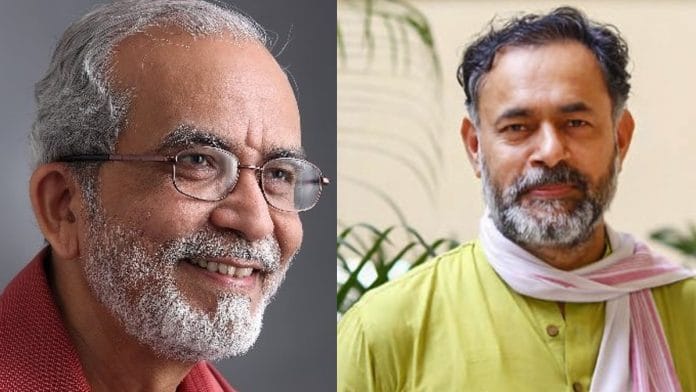New Delhi: Suhas Palshikar and Yogendra Yadav, who helped develop the NCERT political science textbooks for classes IX to XII, Monday wrote to the council’s director D.P. Saklani saying they will take legal action if their names are not dropped from the textbooks that have undergone “indiscriminate distortion”.
Yadav and Palshikar had in June last year requested the NCERT to drop their names as chief advisers from the textbooks, but the council had refused to do so citing its status as copyright owner, while also stressing that no one can claim individual authorship.
In their latest letter to the NCERT, Palshikar and Yadav wrote that more than a year after their request, they were “shocked to discover that the NCERT has gone ahead to publish and distribute the new edition of these six textbooks without removing our names from the publications that we do not wish to be associated with”.
The letter further said: “We are also distressed to learn that the NCERT has taken a step further in its drive towards indiscriminate distortion of these textbooks. Besides the earlier practice of selective deletions, the NCERT has resorted to significant additions and rewriting that are out of sync with the spirit of the original textbooks.”
Also read: RSS-run schools are going strong in West Bengal, and Trinamool Congress is irked
Palshikar and Yadav go on to say that both of them, as chief advisers for the original textbooks, have already registered their “strong disapproval of this unethical, unacademic and illegal practice of mutilation of textbooks that violate both the authors’ rights to intellectual property and the students’ right to quality education”.
On Sunday, ThePrint reported that the NCERT has rewritten a section on vote bank politics in the chapter on secularism in the Class XI political science textbook. Till the last academic session, students were taught that there is “little evidence” to suggest that vote bank politics favours the minorities in the country.
Following the revisions, the students, among other things, will now be taught that in India, political parties “give priority to the interests of a minority group” with an eye on “vote bank politics”, which leads to “minority appeasement”. The rewritten section addresses “anomalies” and presents a “relevant criticism of Indian Secularism”, said the NCERT, justifying the changes.
Among the changes in the Class 12 political science textbook is the deletion of references to the events leading to the demolition of the Babri Masjid and what happened after. The mosque is not even named in the book anymore, it is now introduced as a three dome structure built at the birthplace of Shree Ram.
Palshikar and Yadav, in their letter emailed to Saklani, said that while the NCERT was well within its rights to withdraw these and publish new textbooks, it has no moral or legal right to distort these textbooks “without consulting any of us and yet publish these under our names despite our explicit refusal”.
Their letter said: “Both of us do not want the NCERT to hide behind our names to pass on to students such textbooks of Political Science that we find politically biased, academically indefensible and pedagogically dysfunctional….The new editions of these books that have been published with our names should be withdrawn from the market forthwith. If the NCERT fails to take immediate corrective action, we may be forced to take legal recourse.”
Palshikar and Yadav were associated with the previous revision of the National Curriculum Framework (NCF), based on which the current set of textbooks was prepared. But over the years, particularly since 2014, these textbooks have undergone several revisions.
(Edited by Gitanjali Das)
Also read: In eye of NEET storm, a look at origins of India’s testing agency NTA & past controversies






